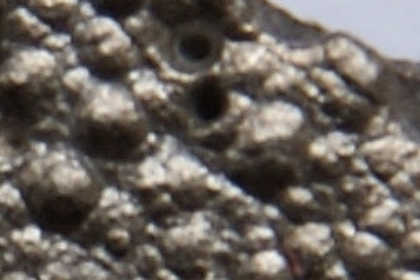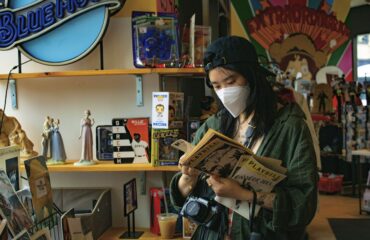TWO POEMS by C. Dale Young

FOR ITS BLUE FLICKERING
If you take cobalt as a simple salt
and dissolve it—if you dip a small metal loop
in such a solution and place it in a standard
flame, it burns a brilliant blue,
the flame itself bluer than the richest of skies
in summer. I wanted to be that blue.
And so, I claimed that element as my own,
imagined that fire could make of me
something bluer than the bluest of blues.
But what does an eighteen-year-old boy know
of the blues? All I knew then of cobalt
was its stable isotope. I had no knowledge
of the radioactive one with its gamma rays
used for decades to treat cancer. I had yet
to be exposed to such a thing. I was hot
for cobalt, for its blue flickering. Chemistry
can be such an odd thing. When a teacher of mine
offered up that faggots doused in certain chemicals
burned blue, I saw it as a sign; how can we
not see such things as signs, as omens?
Blue the waters of the Caribbean Sea,
blue the skies over the high deserts,
and blue the passages I found in old Greek texts
that surprised my prudish sense
of what men could do with men. It always
came back to blue. But boyish ideas are just that.
They seem for all the world to be fixed things,
when all they are is merely fleeting. In the end,
my make up was none other than anthracite,
something cold, dark, and difficult to ignite.
It is dense, only semi-lustrous, and hardly
noticeable. One dreams in cobalt, but one lives
in anthracite. Yes, the analogy is that basic.
Anthracite, one of earth’s studies in difficulty:
once lit it burns and burns. Caught somewhere
between ordinary coal and extraordinary graphite,
anthracite surprises when it burns. It isn’t flashy—
it produces a short, blue, and smokeless flame
that reminds one of the heart more than the sky.
PORTRAIT IN AZURE AND TWINE UNRAVELLING
Sometimes what attracts us is nothing more
than a marker of what is wrong with us.
Ravel was heralded as a genius, a master
of Impressionism, for his use of highly repetitive
structures, his rhythmic and repetitive structures.
Who can deny the beauty of Bolero? Not me.
As a child, I asked my mother to listen to me
while I practiced words like cobalt, each one more
and more odd for their sounds, their structures,
something I was still figuring out. “Grant us
Peace,” we repeated at Mass. Everything was repetitive.
And that is how it started, me trying to master
the language, the very words, fearful they would master
me, instead. Azure, sinecure, the long u had me
so early, and then the hard t one finds in repetitive,
substantive, titillation. I always needed more and more
words. Debussy once described Ravel as a man just like us,
one who understands that repetition structures
the way we move through the world, structures
our very breath, breath being that thing necessary to master
song, language, the natural world around us.
The first time I took a lover, she took time to watch me
sitting on the edge of the bed mouthing the word more.
After four hours, she dressed and called me repetitive,
told me the fun of it had ended, had become repetitive.
Memory, even when about something painful, structures
our worlds, structures our hearts and minds and more.
Within years of writing Bolero, Ravel could no longer master
music. He even lost the ability to use language. Imagine me
hearing this story. We were still new to each other, not yet us
but still a me and you. When Ravel left this world, left us,
you told me, many thought him mad and madly repetitive
pouring the same cup of water over and over. “Listen to me,”
you said. “Music is more than the simple structures
one need master.” I chose language instead of music to master,
all 171,000 words in the English language and more.
This morning, you caught me mouthing something other than more.
Ravel was not a man like us. Really. I just needed a new word to master.
My love, I’m repetitive. I sit here saying: “structures, structures, structures.”


